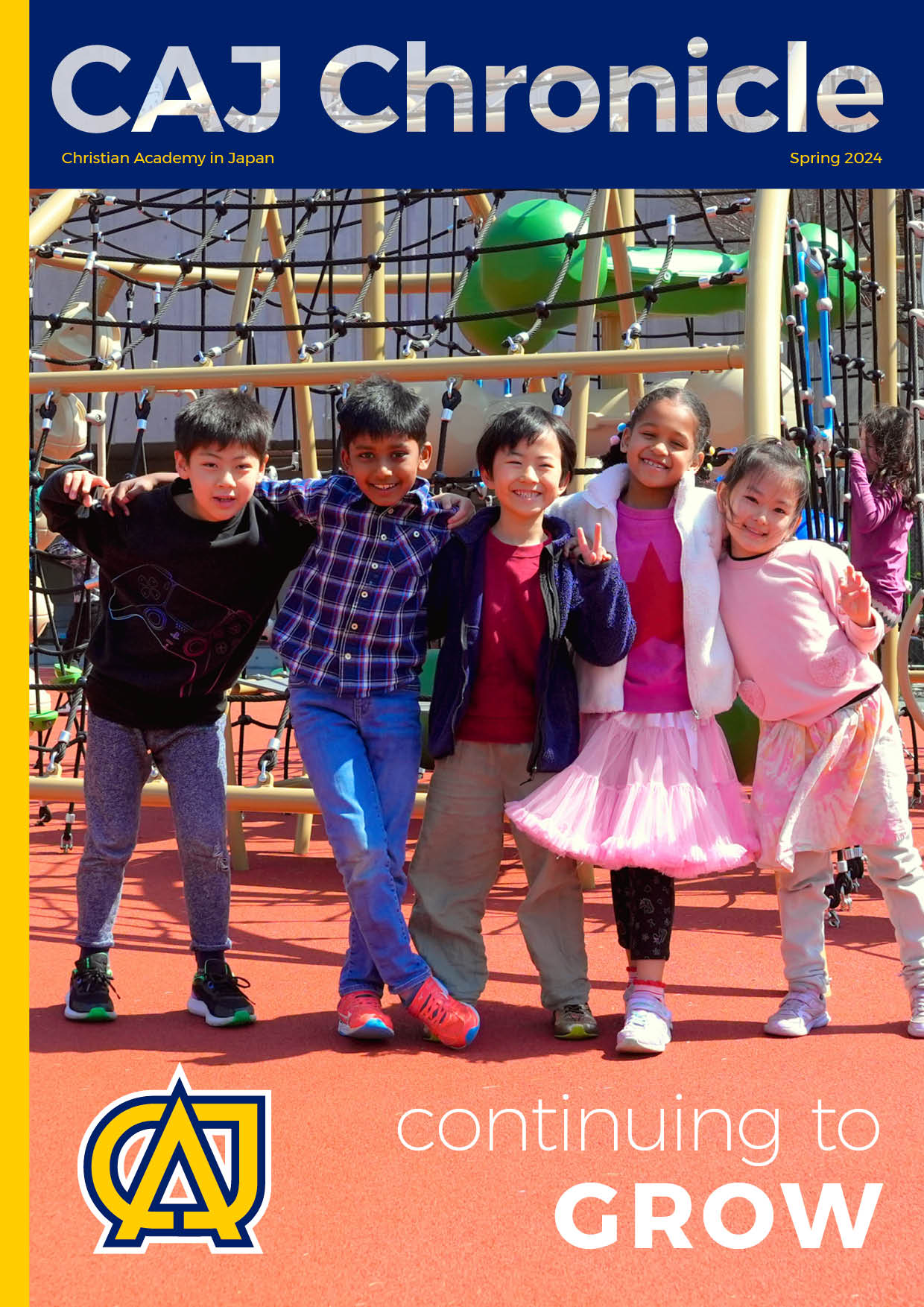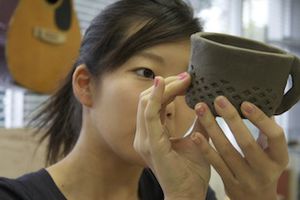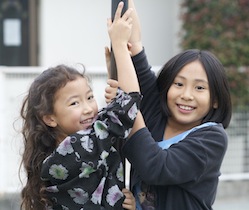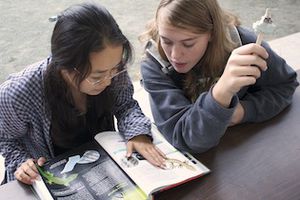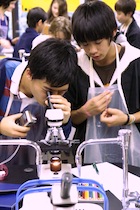Understanding a Christian-Focused, Western-Style Education
(日本語訳:Understanding a Christian-Focused, Western-Style Education, Japanese)
The purpose of this article is to help you understand more about a Christian-focused, western-style education as you consider enrolling your child at Christian Academy in Japan (CAJ). CAJ uses an American curriculum delivered in English. Although this brochure is not exhaustive, it does provide you with an explanation of some of the most important concepts of CAJ’s program and how it might differ from other schools. Please share this information with your child; it will give him or her a better understanding of the adventure ahead.
The following are ten important concepts of the model of Christian-focused, Western-style education that CAJ uses with some practical suggestions for parents to help your child be successful.
CAJ’s Christian-focused, Western-style education...
Contents
- 1 Explores a Christian perspective in all areas and subjects using the Bible and other Christian resources
- 2 Focuses on the student as a whole person
- 3 Emphasizes higher order thinking skills
- 4 Involves the parents as team members in the educational process
- 5 Administers discipline in a fair and consistent manner to modify inappropriate behavior
- 6 Places a realistic emphasis on grades
- 7 Utilizes a variety of assessment tools
- 8 Emphasizes a realistic college selection process
- 9 Utilizes English as its language of instruction and requires the acquisition of a high level of English to be successful
- 10 Emphasizes developing a personal worldview and living consistently using that worldview
Explores a Christian perspective in all areas and subjects using the Bible and other Christian resources[edit]
CAJ’s educational philosophy is based on the belief that everything in our lives and every square centimeter of creation belongs to God. Students are challenged and taught to see the world through the lens of the Bible. Christian teachers don’t avoid teaching about the world, but they help students see it just the way it is: created perfect by God, damaged by sin, and redeemed by Christ. The Bible is also used to learn skills for restoring every aspect of a fallen world—whether at school, work, play, or in worship. Students, whether Christian or not, are taught to use the Bible as a powerful tool to work towards a better world. This instruction extends to co-curricular and outside-of-class activities.
- Suggestions for Parents
- a. Encourage your child to read the Bible and spend time with him or her studying the Bible’s stories and principles.
- b. Help your child learn more about Christian lifestyles through Christian movies, music, literature and culture.
- c. Discuss both Christian and non-Christian things with your child, encouraging him or her to think deeply about the meaning of what happens in the world around us.
- d. Encourage participation in church and Sunday school as well as Christian youth groups, camps, and activities.
Focuses on the student as a whole person[edit]
Because CAJ prepares students to have the option of attending college, academics are very important. However, CAJ remains dedicated to educating the whole person, spiritually, academically, socially, emotionally and physically. A western-style school tries to strike a balance where no one aspect of the student’s education is emphasized over another. A Christian school looks for every child’s individual talents and teaches students to honor and use the gifts God has given them. We challenge our students to strive for the highest potential within their gifts, to develop strong character and leadership qualities, to learn to live in a global community, to serve others, and to accept responsibility.
- Suggestions for Parents
- Encourage your child to get involved in co-curricular activities such as athletics, drama, student government and music.
- Support your child’s involvement in co-curricular activities by attending his or her performances and competitions.
- Help your child discover his or her unique and special gifts and talents.
Emphasizes higher order thinking skills[edit]
Although some memorization and rote memory of content will always be required in a course of study, the integration, analyzing and application of information and ideas will be emphasized in a western educational system. It is important that a student has the ability to recall certain facts and knowledge; however his or her ability to think critically is considered more important. The emphasis is on utilizing these facts to problem-solve and to apply information to real-life situations. In western education, the emphasis is not on how much you know, but on knowing where to find information, being able to discern its validity and usefulness, and applying knowledge to solve a problem. A Christian education also challenges students to seek consistency between their beliefs and actions.
- Suggestions for Parents
- Start when your child is young to encourage him or her to think through problems he or she encounters at home or with schoolwork. Don’t always give your child the answers or simple solutions, but permit him or her to ponder, puzzle and struggle with problems. Help your child to reach solutions by giving hints but don’t permit him or her to get too frustrated.
- Encourage your family to work together or individually to solve simple puzzles or mind games.
Involves the parents as team members in the educational process[edit]
In a western, Christian school like CAJ, teachers and parents are seen as a team working together to educate each child. Teachers need the support of every student’s parents in order to be successful. Parents should communicate often with their children’s teachers and not be concerned that this would be seen as interfering or fear that such communications might negatively impact their children’s grades. Parents and teachers can also keep in contact with one another through parent-teacher conferences, involvement in the Parent-Teacher Association (PTA), and attendance at fine arts and athletic events. To foster this close relationship between parents, teachers and students, it is important that parents understand that students need the constant support of a parent, relative, or significant adult who will be responsible on a daily basis for their health and general welfare. In order to achieve this, CAJ requires that students live with one or both parents, or in a head-of-school-recognized boarding placement.
While in a western school, parents will be communicated with often via e-mail, letters, newsletters, calendars and telephone calls. Parents are expected to encourage and assist their children at home in their studies and activities. In some situations some parents may have questions, misunderstandings, and/or feelings of disappointment about the performance of certain school employees (i.e. teachers, support staff or administration). In a school managed by western management principles, it is important to follow appropriate procedures and institutional hierarchy when addressing concerns. If there are problems, if possible, please first talk directly with the person concerned. Both parties should attempt to listen to one another to determine clearly what the facts are regarding the areas of concern. If, after meeting together, the issue cannot be resolved, the school principal or other administrator should be contacted to become involved in mediating. If this does not bring resolution, the head of school should be contacted. This reflects a biblically sound process outlined in Matthew 18.
- Suggestions for Parents
- Frequently ask your child about school life and his or her academic progress. Homework should be checked frequently and praised when appropriate.
- Attend all scheduled parent-student-teacher conferences each year and communicate with the teacher and administration when you have a question or concern.
- Be active in the PTA. The CAJ PTA is quite different in structure and expectations from PTA groups in many Japanese schools. For more information see our website.
- Show your support through attending school activities, such as Back-to-School Day, conferences, athletic events, concerts, plays, field days and PTA events and meetings.
- Be sure you are able to clearly communicate with the school and the teachers. For some families this means having a plan in place to translate English messages to and from the school.
Administers discipline in a fair and consistent manner to modify inappropriate behavior[edit]
In western education corporal punishment is not used. Discipline is meant to be educational and never used in a manner to degrade or demean a student. Discipline at CAJ is administered by balancing Christian principles like justice and grace. A western school such as CAJ sees the teacher and administration working as a team with parents to instruct children in appropriate behavior. Consistency and fairness in the administering of discipline are always important.
- Suggestions for Parents
- Support teachers and administrators when it is necessary to administer discipline.
- Frequently talk to your child to keep the line of communication open. You should talk to your child about school life and his or her friends.
- Parents and students should read and become thoroughly familiar with the school policies outlined in the CAJ student handbooks.
Places a realistic emphasis on grades[edit]
In a school such as CAJ, where most graduates go on to western colleges, grades are important. However, an over-emphasis on a numerical or letter score may sacrifice true learning and create an unhealthy situation by overly stressing a student. Mastery of life skills such as collaboration, leadership and honesty is more important than grades. Western education tries to de-emphasize grades and emphasize the joy of learning and doing one’s individual best. Christian education encourages students to seek ways to honor God by using their individual gifts and talents. Creativity and imagination don’t always translate to a high grade point average (GPA) but are attributes that have long-lasting rewards. Learning can be taught to be a rewarding activity and not solely a means to achieve good grades. CAJ wants to foster a love of learning where students desire to learn throughout their lives.
- Suggestions for Parents
- Offer some incentives or rewards for good grades but avoid putting too much pressure on your child.
- Avoid stern punishment when you and the teacher can determine that your child has done his or her best. Some children bloom or become motivated later in their school career.
- Remember that some children excel and are gifted by God in different areas of school life outside of academics and should be complimented for their efforts.
Utilizes a variety of assessment tools[edit]
In a western school such as CAJ, assessment is done in a number of different ways. Assessment is done frequently and is not dependent upon just one test to measure success or achievement. Western education uses not only paper-and-pencil tests but also verbal, anecdotal, portfolio, project, and presentation forms of assessment. One test is seldom the sole measure of success. It should be noted that advancement to the next grade level or higher level of education in high school is based upon units of credit as opposed to a single test score. This also applies to many western college applications where grades and test scores are not the sole factor for acceptance. Most North American colleges do not rely on a placement test. Letters of recommendation and involvement in co-curricular activities and student life are also very important for acceptance to quality colleges in North America.
- Suggestions for Parents
- Encourage your child to place value and importance on every assignment he or she receives and not put all of his or her efforts into one or more test scores.
- Monitor your child’s progress closely and help him or her to not become too discouraged by one test score.
- If your child is struggling academically, be sure to communicate promptly with the teacher.
Emphasizes a realistic college selection process[edit]
In the western educational system, the goal is to prepare students to be successful in college and in life rather than merely to be selected by a big-name or prestigious school. CAJ tries to work with students and parents to set realistic goals and to emphasize education and learning rather than prestige. Particularly at the undergraduate college level, factors such as classroom size, total enrollment, graduation percentages and overall quality of instruction for the financial investment are important considerations. Although CAJ does a commendable job of preparing its students to attend the colleges of their choice, western educational systems recognize that not all students are ready or have the aptitude for a four-year college. Some students are more successful attending an alternative program or community college, and some are ready for options other than college.
- Suggestions for Parents
- Encourage your child to speak with the school’s academic counselor, check the college catalogs and handbooks, and investigate options using our Naviance guidance software.
- Start looking at colleges early and perhaps even visit some if you are in the United States or other countries.
- Attend information workshops held by the school academic counselors and principals.
- As a family, you and your child should sit down and consider options and set realistic goals, including the financing of college.
Utilizes English as its language of instruction and requires the acquisition of a high level of English to be successful[edit]
In many western international schools, the language of instruction is English, and all students are required to acquire proficiency in that language. CAJ is a school that teaches in English, not a language school that seeks to teach English beyond our limited English as an Additional Language (EAL - formerly ESL) support program. While CAJ values and promotes the many benefits of multilingualism, students at CAJ will be completely immersed in the English language during classes and activities. This is required in order to assist them in the full acquisition of the language, including listening, speaking, reading and writing skills. A limited EAL (ESL) program at the school will assist in this acquisition. However, students must demonstrate both an aptitude and a strong work ethic to be successful. Students attending CAJ are being prepared for continuing education in English. Most students do not thrive if they are also doing extensive juku (cram school) education or other intensive programs outside of CAJ during the school year.
- Suggestions for Parents
- Read to your younger children in both their native language and English and encourage your older children to read English fiction and non-fiction works for enjoyment. CAJ’s library has English resources including audio books, fiction and research materials.
- If possible, speak some English in the home to reinforce your child’s language acquisition.
- Consider the purchase of a computer with English software and operating system.
- If your child is a beginning EAL (ESL) student in the fall, it is recommended that he or she attend CAJ’s EAL (ESL) summer program.
- Pursue opportunities to be immersed in English such as summer camps, SSS programs (see our website), and travel.
- During the school year, students should not be enrolled in programs outside of CAJ that require extensive time and homework commitments.
Emphasizes developing a personal worldview and living consistently using that worldview[edit]
Our core mission statement indicates that we are equipping students to server Japan and the world for Christ. Students at CAJ are challenged to learn about the world and then make discerning choices about what they believe, how they react, and how they live. Whether Christian or not, all students are asked to be able to articulate and defend what they believe using faith, evidence and sound reasoning. Students are encouraged to engage in service projects and outreach programs and to be good stewards of resources.
- Suggestions for Parents
- Ask your child regularly what they believe and why they believe it.
- Challenge your child to show behaviors consistent with what they believe and with high standards.
- Discuss both Christian and non-Christian things with your child, encouraging them to think deeply about the meaning of what happens in the world around them.
Acknowledgements
This article relies extensively on materials created by parents and staff at Dalat International School, Malaysia, and Taejon Christian School, Korea, as well as excerpts from a brochure published by Christian Schools International. All materials are used with permission. We appreciate the extensive work by parents, staff, and professional consultants from each of the schools including parents and staff who contributed to CAJ’s carefully considered modifications and additions.
